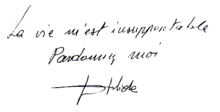Suicide note: Difference between revisions
+image |
SuperbowserX (talk | contribs) No edit summary |
||
| Line 26: | Line 26: | ||
{{Portal|Writing}} |
{{Portal|Writing}} |
||
* {{annotated link|Death poem}} |
* {{annotated link|Death poem}} |
||
* [[Deathbed confession]] |
|||
* {{annotated link|Last words}} |
* {{annotated link|Last words}} |
||
* {{annotated link|Will and testament}} |
* {{annotated link|Will and testament}} |
||
Revision as of 00:06, 31 January 2024

| Suicide |
|---|
A suicide note or death note is a message written by a person who intends to die by suicide.
A study examining Japanese suicide notes estimated that 25–30% of suicides are accompanied by a note. However, incidence rates may depend on ethnicity and cultural differences, and may reach rates as high as 50% in certain demographics.[1] A suicide message can be in any form or medium, but the most common methods are by a written note, an audio message, or a video.
Reasons
Some fields of study, such as sociology, psychiatry and graphology, have investigated the reasons why people who complete or attempt suicide leave a note.
The most common reasons that people contemplating suicide choose to write a suicide note include one or more of the following:[2]
- To ease the pain of those known to the victim by attempting to dissipate guilt.
- To increase the pain of survivors by attempting to create guilt.
- To set out the reason(s) for suicide.
- To send a message to the world.
- To express thoughts and feelings that the person felt unable to express in life.
- To give instructions for disposal of the remains.
- Occasionally, to confess acts of murder or some other offence.[3][4][5]
Sometimes there is also a message in the case of murder-suicide, explaining the reason(s) for the murder(s), see for example, Marc Lépine's suicide statement and videotaped statements of the 7 July 2005 London bombers.
See also
- Death poem – Genre of poetry
- Deathbed confession
- Last words – Final words attributed to a person before their death
- Will and testament – Legal declaration by which a person distributes their property at death
References
- ^ SHIOIRI, TOSHIKI; NISHIMURA, AKIYOSHI; AKAZAWA, KOHEI; ABE, RYO; NUSHIDA, HIDEYUKI; UENO, YASUHIRO; KOJIKA-MARUYAMA, MAKI; SOMEYA, TOSHIYUKI (April 2005). "Incidence of note-leaving remains constant despite increasing suicide rates". Psychiatry and Clinical Neurosciences. 59 (2): 226–228. doi:10.1111/j.1440-1819.2005.01364.x. PMID 15823174. S2CID 28986718.
- ^ Olson, Lenora (2005). The Use of Suicide Notes as an Aid for Understanding Motive in Completed Suicides (Thesis). University of Utah.
- ^ "Suicide note reveals murder confession". London: bbc.co.uk. 1971-07-14. Retrieved 2008-10-28.
- ^ "Man jailed for murder in lay-by". London: bbc.co.uk. 2008-03-01. Retrieved 2008-10-28.
- ^ "Suicide note found in murder-suicide case". cbc.ca. 2000-06-23. Retrieved 2008-10-28.
